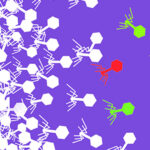A team led by Environmental Genomics and Systems Biology (EGSB) staff scientist Vivek Mutalik demonstrated for the first time that they can, on a genome-wide scale, identify phage genes that are essential (or not) to infecting bacteria, and then replace non-essential DNA with distinctive barcode tags. These barcodes could enable investigators and clinicians to quickly identify and track different phages in diverse settings, similar to how product barcodes are used in supermarkets. Brought to scale, the method stands to unlock potent biotechnology applications relevant to agriculture, the environment, human health, and more.
Was this page useful?
Send




